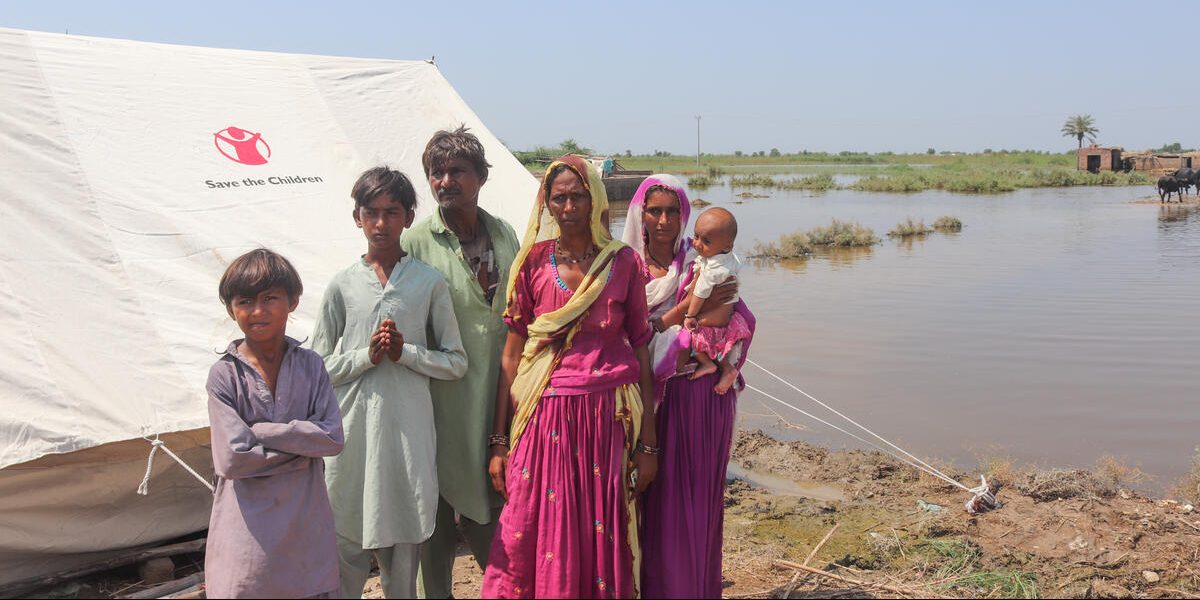Through a strategy of staff deployment and establishing partnerships with local stakeholders, the HLA was able to deliver a localised response to strengthen local capacity in the aftermath of the destructive monsoon floods.
In 2022, Pakistan faced an unprecedented disaster as it was hit by the most severe flooding in decades. The catastrophic floods directly affected more than half of the country’s provinces, submerging one-third of the country under water, and leaving over 33 million people in urgent need of assistance.
The HLA and Save the Children International – alongside other humanitarian actors and INGOs – face a formidable and complex operational landscape characterised by economic and political instability, as well as challenging bureaucratic procedures.
Capacity constraints and limited financial resources further hamper the availability of staff – particularly technical personnel.
Developing a localised response
In the context of this complex operational context, staff from the HLA Asia Regional Centre together with Save the Children International developed a localised response strategy.
The team first undertook an assessment of the strengths and needs involved by collating structured feedback from staff and leaders to map capacity needs. The action plan comprised both a short-term and longer-term action plan to identify specific capacity-strengthening resources.
The HLA’s Regional Capacity Building Manager undertook a two-month deployment to Pakistan to lead the HLA response, enabling the organisation to be part of the response from the onset. He was able to take a lead on delivering tailored learning needs of the staff and partner organisations to enable the team to deliver a timely and effective response that is also aligned to the needs of the affected communities.
The in-person deployment also enabled the HLA to better understand the local context and to work closely with the senior leadership, operational and technical teams, as well as to understand the learning needs of response and partner staff and areas for improvement.
Delivering training in priority areas
Given the challenging operational environment and capacity limitations, training efforts focused on critical areas including safeguarding, gender, education, water, sanitation and hygiene (WASH), child protection, cash and voucher assistance (CVA), and food security and livelihoods (FSL).
A combination of in-person and online training sessions were conducted over the year. Notably, 10 in-person education training sessions aimed at establishing and managing Temporary Learning Centres (TLCs) were conducted, benefitting 112 partner staff and 13 Save the Children International staff.
Meanwhile,12 safeguarding training sessions were delivered to 29 partner staff and 64 Save the Children International personnel, and nine comprehensive learning sessions on child protection were delivered to partners, benefiting 94 staff.
Asad Zia Iqbal, Regional Capacity Building Manager, expressed the challenges faced during the response to the floods in Pakistan and emphasised the significance of partnership with local organisations. Asad remarked:
“Working in collaboration in Pakistan enabled us to better meet the training needs essential for the emergency response across multiple priority areas, including safeguarding, education, and WASH. Thank you to our partners for their ongoing support.”
To support ongoing online training, a dedicated resource for the Pakistan flood response was established through the Response Learning Hub. This platform features customised learning resources tailored to the needs of response staff and partners, aiding in their professional development and improving their effectiveness in the field.
Looking ahead: future initiatives
Plans are already underway for the next phase of work, which involves piloting new in-person training of the Humanitarian Operations Programme (HOP); Field Managers In Emergencies and Learning and Development (FIELD) programme and Transformation of Training (ToT).
Further emergency preparedness training is scheduled for spring/summer 2023 for partners, including staff from government departments.
The HLA Asia Regional Centre extends its gratitude to its partners for their continuous support in these endeavours.



